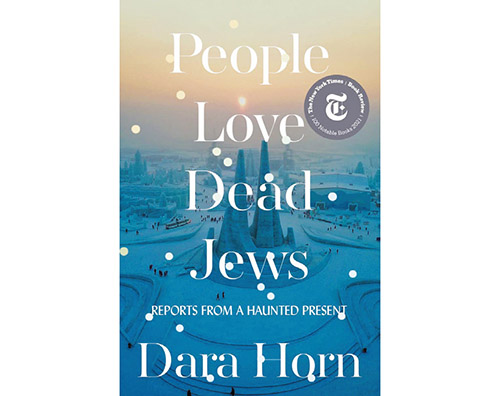


Highlighting: “People Love Dead Jews: Reports From a Haunted Present” by Dara Horn. W. W. Norton & Company. 2021. English. Hardcover. 272 pages. ISBN-13: 978-0393531565.
According to a 2021 report by the Anti-Defamation League, 2020 marked the third highest year for antisemitic incidents in New Jersey, with 295 reported incidents across the state. This includes a 48% rise in antisemitic activity in Middlesex County alone. In fact, New Jersey rates among one of the top states when it comes to antisemitic harassment, vandalism and assault. Most notable in New Jersey’s recent history was the 2019 brutal attack on the kosher market in Jersey City.
So it is not without cause that author and Short Hills resident Dara Horn felt compelled to write her most recent book, “People Love Dead Jews,” which explores antisemitism in America and around the world.
And it is no surprise that so many people turned up last Thursday night at the Joseph Kushner Hebrew Academy (JKHA) in Livingston to hear her speak about it.
Ariel Levenson, middle school principal at JKHA, introduced Horn, her older sister, to a full audience at the Kushner school library. “Dara is ‘one of my favorite living Jews,’” Levenson said, riffing on the book’s title.
Horn spoke about the incident that started her on the journey to write her book. In 2018, a young man who worked at the Anne Frank House in Amsterdam was told that he was not allowed to wear his kippah to work. He requested special permission, and after four months and a lot of negative press, the museum ruled that he could indeed wear his kippah to work.
“Four months is a very long time for the Anne Frank House to ponder whether or not to force a Jew into hiding,” Horn noted.
Horn’s book covers incidents of antisemitism as far from home as Harbin, China and as close to home as New York City. However, it’s not just the antisemitism that Horn is interested in dissecting, but the way it is represented. When the Jersey City attack was covered in the press, Horn said that there was no mention of the victims without an attempt to vilify them, insinuating that gentrification in the neighborhood was somehow an acceptable—or even plausible—explanation for such violence. This coverage, she argued, is in and of itself antisemitic apologetics.
Horn believes that education is at the root of the problem. If you open up a history textbook, you will get one small section on the Jewish people, she said. If it is an ancient history textbook, the chapter will be about the Israelites and slavery in Egypt, without even a mention that these are Jews. If it is a modern history textbook, the chapter will be about the Holocaust, in which Jews are used to show the limits of humanity. Young people, however, are not taught about what being Jewish really is.
Even in Holocaust education, she argued, there is a vast attempt to make murdered Jews seem just like everyone else. Pointing to Daniel’s Story at the United States Holocaust Memorial Museum in Washington, D.C., Horn observed that Daniel is a boy just like any other German boy. He has sports trophies on his wall. His father was a war hero. His murder is a tragedy because Jews are people, too, just like everyone else.
But, Horn said, Jews are not just like everyone else. Judaism is in fact a counterculture that has persisted for thousands of years due to its creativity and resilience. The average child murdered in the Holocaust was not an assimilated German, but a Yiddish speaker.
This is not to say Holocaust education isn’t important, Horn said emphatically. Rather, it is imperative that people see the Yiddish speaking boy with curly sidelocks as just as sympathetic a character as Daniel. Moreover, she worries that Holocaust education on its own—without a more substantive education on Judaism—is desensitizing non-Jews to antisemitism. People think that if it isn’t mass murder, it isn’t antisemitism, Horn said.
When asked about the responses she has gotten to her book, Horn said that she has received hundreds of “disturbing” emails from Jewish readers who have experienced antisemitism in their lives, incidents that were often dismissed or downplayed for being unimportant. Additionally, she has received very positive feedback from non-Jewish readers. There are an enormous number of people with a lot of good will, who want to be good allies, but didn’t know how, Horn said.
“People Love Dead Jews: Reports from a Haunted Present,” W. W. Norton & Company, is available in hardcover.
The event was sponsored by the Federation of Greater MetroWest and the Greater MetroWest Jewish Day Schools, Golda Och Academy, Gottesman RTW Academy, JEC and JKHA/RKYHS.
By Talia Liben Yarmush










